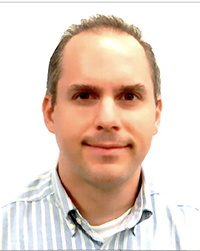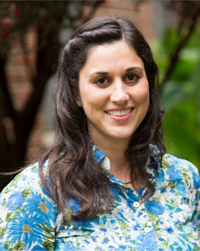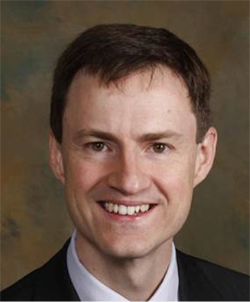K12 Scholars
 Name: Jonathan Budzik, MD, PhD
Name: Jonathan Budzik, MD, PhD
Mentor: Jeffery Cox, PhD
Scholar Term: 01/2018 - present
Dr. Budzik received his undergraduate degree at Dartmouth College. As an Arnold and Mabel Beckman scholar in the laboratory of Dr. George O'Toole, he discovered a bacteriophage capable of mediating transduction between strains of Pseudomonas aeruginosa. This experience inspired Dr. Budzik to pursue further microbiology training as a MD/PhD student in Dr. Olaf Schneewind's group at the University of Chicago where he studied the mechanism of pilus assembly in Gram-positive bacteria. As an internal medicine resident at UCSF, Dr. Budzik developed a keen interest in M. tuberculosis pathogenesis and completed a translational research project on the association between TB treatment outcomes, pyrazinamide resistance, and bacterial lineage. Dr. Budzik's research during pulmonary and critical care fellowship explored how the innate immune system responds to TB infection. He serves as an attending physician and associate co-director for the UCSF adult cystic fibrosis clinic.
Tuberculosis is a leading cause of death from infectious disease and new treatments are needed to combat multi-drug resistant isolates. The goal of Dr. Budzik's research is to discover the mechanism of kinase-dependent targeting of M. tuberculosis to autophagy, a process that restricts M. tuberculosis growth in host cells. We developed an unbiased method to measure global changes in macrophage protein phosphorylation levels during TB infection. We are now studying the role of phosphorylated autophagy proteins in controlling TB infection. A better understanding of the host pathogen interaction will allow for the design of novel host-directed therapies for tuberculosis.
 Name: Charles Langelier, MD, PhD
Name: Charles Langelier, MD, PhD
Mentor: Joseph DeRisi, PhD
Scholar Term: 07/2016 - present
Dr. Langelier is an Assistant Professor in the Division of Infectious Diseases. He received a B.A. in Chemistry/Biochemistry from Colby College. Influential experiences in Uganda and Tanzania as a medical student catalyzed a passion for infectious disease medicine and motivated PhD research in the Sundquist laboratory at the University of Utah studying the host-pathogen biochemistry of HIV replication. Dr. Langelier became involved in patient-oriented translational research during his internal medicine residency and infectious diseases fellowship at UCSF. His research leverages NGS technology to identify pathogens, evaluate host responses and predict antimicrobial resistance in patients with severe respiratory infections. Dr. Langelier also studies mechanisms by which environmental exposures modulate respiratory infection severity and susceptibility.
Lower respiratory tract infections (LRTI) are the leading infectious cause of death worldwide. Despite this, the responsible pathogens remain unidentified in most cases due to the limitations of current medical diagnostics. This can lead to ineffective empiric treatments, excessive broadspectrum antibiotic use and adverse outcomes. To directly address the need for improved LRTI diagnostics, Dr. Langelier engages next generation sequencing (NGS) technology to understand the microbial causes of severe respiratory infections. By capturing both microbial and human RNA from clinical samples, NGS allows for simultaneous transcriptional profiling of both microbial genomes and host immunologic responses. This enables precision diagnosis to inform treatments and target antibiotic use. In addition, this approach provides a dynamic tool for studying host/pathogen interactions in the setting of acute respiratory disease.
 Name: Michael Peters, MD
Name: Michael Peters, MD
Mentor: John Fahy, MD
Scholar Term: 07/2015 – 06/2017
Asthma is a chronic heterogeneous inflammatory disease and is one of the most common lung diseases in the United States affecting 7% of the population. An estimated 5-10% of asthma subjects have severe disease characterized with sub-optimal responses to currently available treatments. This unmet need for better treatments contributes to the major public health burden asthma poses to the nation. Dr. Peters’ work focuses on identifying the molecular pathways that contribute to asthma severity in order to develop novel asthma therapeutics. Dr. Peters’ specific focus has been on understanding how increases in metabolic dysfunction and systemic inflammation could drive asthma severity. The K12 program has enabled Dr. Peters in accomplishing these goals by providing protected research time, structured mentoring, and resources to expand his skills in gene transcriptomics and proteomics technologies.
Dr. Peters received his undergraduate degree in Economics from Emory University. He completed his MD at the State University of New York at Stony Brook, and his Internal Medicine residency at the University of Colorado, Denver. Most recently he completed his fellowship in Pulmonary and Critical Care medicine at the University of California, San Francisco and he is now an Assistant Professor of Medicine at UCSF. He serves as an attending physician in the intensive care unit at Moffit/Long Hospital and in the severe asthma clinic at UCSF.
 Name: Neeta Thakur, MD
Name: Neeta Thakur, MD
Mentor: Esteban G. Burchard, MD, MPH
Scholar Term: 07/2015 – 06/2016
Dr. Neeta Thakur is an Assistant Professor and a practicing pulmonary and critical care physician at UCSF-SFGH who examines the role of social adversities on asthma susceptibility and morbidity in vulnerable populations. Dr. Thakur completed a dual degree program in public health and medicine at the University of Arizona focused on community health and program development and evaluation. She came to UCSF for residency in Internal Medicine and stayed to complete a fellowship in Pulmonary and Critical Care Medicine. Dr. She is currently a member of the Asthma Origins Laboratory, under the mentorship of Dr. Esteban Burchard. The lab focuses on studying the interplay between individuals’ genes and their social and physical environments to determine the root causes of asthma health disparities.
Asthma is a common and challenging disease of childhood that disproportionately affects poor minority populations. These populations experience an excess of social adversities, which are important risk factors for asthma morbidity. Asthma is a heterogeneous disease and several asthma phenotypes have been suggested to help categorize at-risk populations. These phenotypes are linked to specific health outcomes such as inhaled corticosteroid response and frequent exacerbations. Applying similar tools employed to identify these phenotypes, Dr. Thakur aims to define the asthma phenotypes that exist in disadvantaged, minority populations and develop a risk profile that identifies individuals at high risk for poor outcomes. This profile will consider the importance of wide-ranging data, including demographic, clinical, social, and environmental data coupled with stress-related biomarkers and genetic data, and will determine which variable are the most useful in predicting who is at risk. This profile will allow providers to better risk stratify individuals and allow for targeting of interventions at those most in need of and, potentially, most receptive to interventions.
 Name: Stephanie Christenson, MD
Name: Stephanie Christenson, MD
Mentor: Prescott Woodruff, MD, MPH
Scholar Term: 07/2014 – 06/2015
As the third leading cause of death in the United States with very few therapies that modify long-term outcomes, chronic obstructive pulmonary disease (COPD) is an important public health concern. Dr. Christenson’s long-term research goal is to leverage genomic applications to identify biomarkers of biology-specific sub-phenotypes (endotypes) of COPD, and use these biomarkers to target therapies to endotypes, and thus personalize COPD therapy to improve clinical response. Dr. Christenson has focused her interest to the area of airway genomics during her internal medicine residency at Boston University. Under the mentorship of Dr. Avrum Spira, she studied the alterations in global microRNA profiles in the airway with smoking and COPD, and their associations with gene expression.
Following residency she finished a year-long post-doc in Dr. Spira’s lab, after which, she transitioned to a pulmonary and critical care fellowship at UCSF. Here, Dr. Christenson has continued research in human airway genomics under the mentorship of Dr. Prescott Woodruff. Over the past 3 years she has focused on using gene expression signatures of airway-specific inflammation in large whole transcriptome profiling datasets to identify asthma and COPD subgroups in which particular inflammatory pathways may play bigger roles in disease pathogenesis. She has used these types of analyses to identify a COPD subgroup in which Type 2 inflammation is particularly important. This suggests that we can identify a COPD subgroup that is more similar to asthma on a biological level (as Type 2 inflammation is more common in asthma pathogenesis), and thus may respond better to inhaled corticosteroids and other asthma-specific therapies.
 Name: John Greenland, MD, PhD
Name: John Greenland, MD, PhD
Mentor: George Caughey, MD
Co-Mentor: Qizhi Tang, PhD
Scholar Term: 04/2014 – 03/2015
Dr. Greenland received his undergraduate degree in Chemistry from Stanford. He did a PhD through the Harvard graduate program in Virology, where he studied the effects of vaccine antigen expression on immune responses. He received an MD from the Harvard-MIT Division of Health Science and Technology and did residency at the Beth Israel Deaconess Medical Center before completing a Pulmonary and Critical Care Fellowship at UCSF. He is currently an Assistant Professor of Medicine at UCSF and Staff Physician at the San Francisco VA Medical Center. He serves as an attending physician in the intensive care unit, pulmonary consult service and outpatient pulmonary clinic at the SF VAMC.
His research focuses on the immunology of lung transplant rejection and is primarily based in the analysis of human airway and peripheral blood samples. This research uses cellular immunology and genomic techniques to understand acute and chronic lung transplant rejection, with a goal of improving outcomes following lung transplantation. The K12 program has enabled him to progress towards these goals through coursework in biostatistics and genomic data analysis, protected research time, structured mentoring, and connections to research resources in transcriptomics, proteomics, and T-cell receptor genomics.
